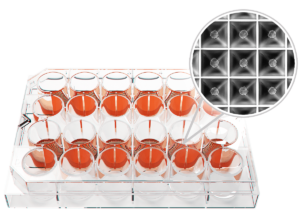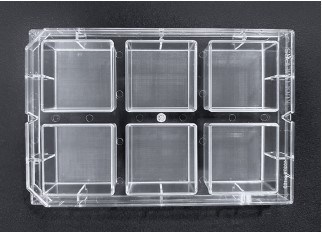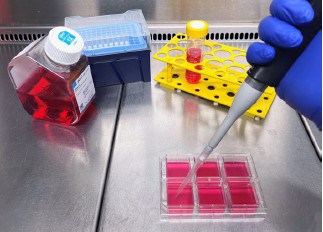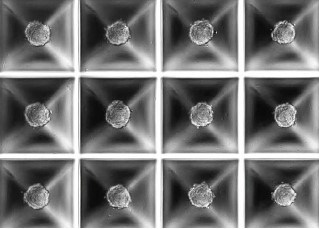Cancer research with SP5D spheroid plates
Tackling the challenges of screening with patient derived cells
Patient-derived tumor cells (PDTCs) are available in limited amounts, are inherently heterogeneous displaying variable growth properties and sensitivity to drugs. These factors present unique challenges for drug screening experiments with tumour spheroids derived from such cells. A method that is economical with cells but that increases the number of spheroids available per treatment (i.e. per well) is the basis of a workable strategy to achieve greater statistical relevance of data. The SP5D 24 well plate offers the possibility to easily generate and test 750 spheroids per well in a 24-well plate format.

Thousands of spheroids for protein recovery
“To simulate physiological conditions while studying molecular markers, a 3D spheroid model was utilized. To extract enough protein, many identical spheroids were grown in a specially designed 5D-Sphericalplate (Kugelmeiers, Switzerland). This specially designed plate can accommodate up to 9000 spheroids/plate i.e. 750 spheroids/well. This high number of spheroids facilitate high protein extraction levels, essential to accurately evaluate expression levels of molecular markers.” – Kulkarini et al. https://doi.org/10.1016/j.msec.2021.111891
Product Page : SP5D Well Plates
References:
Lisa-Marie Philipp, Pirsch Matthias, et al., Synentec Application Note : https://www.sp5d.com/cm/wp-content/uploads/SYNENTECkugelmeiers_sphericalplate_5d_FINAL.pdf
Nishant S.Kulkarni, Vivek Gupta, et al., Materials Science and Engineering
Journal, 2021 : https://doi.org/10.1016/j.msec.2021.111891
Laura Schreyer, Susanne Muehlich, et al., Cancers Journal, 2021 : https://doi.org/10.3390/cancers13215373
Tristen V. Tellman, Mary C. Farach-Carson, et al., International Journal of Molecular Sciences, 2021 : https://doi.org/10.3390/ijms22063218


